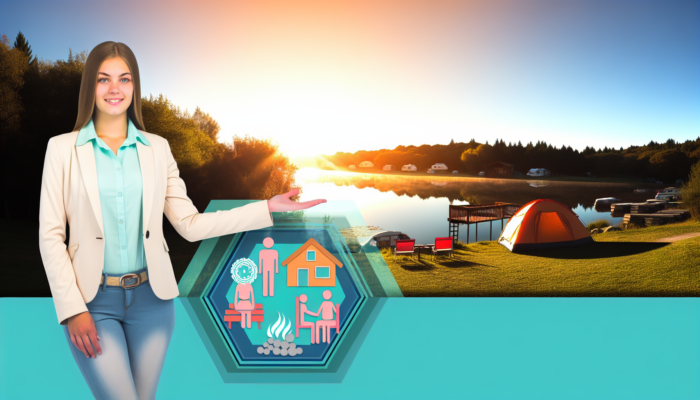Imagine waking up to the sound of chirping birds and the rustling of leaves while basking in the serenity of nature. For many, this is just a dream, but for campground hosts, it’s a daily reality. These unique roles allow individuals to immerse themselves in the great outdoors while providing invaluable services to visitors. But what does it take to become a campground host? Let’s dive into this captivating journey and explore the ins and outs of campground hosting, from the benefits to the responsibilities.
The Allure of Nature
For Sarah, a passionate lover of the outdoors, the idea of becoming a campground host seemed like the perfect opportunity. After years of working in a corporate job that kept her glued to a desk, she sought a lifestyle that aligned more with her love for nature. One day, while hiking in her favorite national park, she stumbled upon a friendly campground host who shared stories about their experiences. This encounter ignited a fire in Sarah to explore this path.
Understanding the Role of a Campground Host
But what exactly does a campground host do? The responsibilities are as varied as the landscapes they inhabit. Campground hosts are essentially the face of the campground. They greet visitors, provide information about the area, and ensure that the campsite remains clean and safe for everyone. Sarah learned that hosts also assist with maintenance tasks, lead interpretive programs, and sometimes even manage reservations.
Finding the Right Opportunity
Determined to pursue her dream, Sarah began her quest to find the perfect campground hosting position. She discovered that many opportunities are available through the U.S. Forest Service, the National Park Service, and various state parks. Each organization has its own application processes and requirements. Some positions offer free camping in exchange for work, while others provide a stipend or hourly wage.
The Application Process
Applying for a campground host position isn’t as straightforward as it might seem. Sarah had to prepare a compelling application that highlighted her skills and passion for camping. She wrote a cover letter detailing her love for the outdoors, her previous volunteer experiences, and her ability to work independently. The key, she found, was to showcase her customer service skills and enthusiasm for helping others enjoy nature.
Training and Preparation
Once Sarah received an offer, the real adventure began. She attended a training session where she learned about park regulations, emergency procedures, and how to handle various situations. This training was crucial, as campground hosts often encounter a wide range of visitors, from seasoned campers to families visiting for the first time. Additionally, she was taught about the local flora and fauna, enabling her to answer visitors’ questions with confidence.
The Rewards of Campground Hosting
As Sarah settled into her role, she quickly discovered the numerous benefits of being a campground host. One of the most significant perks was the opportunity to live among nature, waking up to breathtaking views every day. The sense of community was another highlight; campground hosts often form close bonds with one another, sharing stories and tips while working together.
Moreover, Sarah found that campground hosting offered numerous learning opportunities. Each day brought new challenges, from dealing with difficult visitors to managing unexpected weather changes. These experiences helped her grow personally and professionally, enhancing her problem-solving skills and adaptability.
Building Connections with Campers
One of the most rewarding aspects of Sarah’s job was the connections she made with campers. Each encounter was unique, and she enjoyed sharing her knowledge about the surrounding area. Whether guiding someone to a hidden waterfall or teaching children about local wildlife, she cherished the role she played in enhancing their camping experience.
Challenges and Responsibilities
However, campground hosting isn’t without its challenges. Sarah often faced long hours, especially during peak camping seasons. Managing conflicts between campers could be challenging, and she had to balance her responsibilities while maintaining a friendly demeanor. There were also physically demanding tasks, such as cleaning restrooms and maintaining campsite facilities. Yet, despite the challenges, Sarah felt fulfilled knowing she was making a difference in people’s lives.
Time Management Skills
One crucial skill that Sarah honed during her time as a campground host was time management. With various responsibilities to juggle, she learned to prioritize tasks effectively. Mornings were often spent cleaning and preparing the campground for visitors, while afternoons were dedicated to interacting with campers and leading programs. By creating a structured schedule, she was able to maximize her time and ensure that all tasks were completed efficiently.
Embracing the Lifestyle
As the seasons changed, so did Sarah’s experiences. Each time of year brought its unique charm, from spring wildflowers to autumn foliage. Embracing the outdoor lifestyle meant adapting to the elements and learning how to enjoy nature in different ways. She discovered new hobbies like bird watching, photography, and even foraging for edible plants. This lifestyle transformation was liberating, bringing her closer to her natural surroundings.
Finding Balance
While Sarah loved her role, she also understood the importance of finding balance. Being a campground host required dedication, but it was essential to carve out personal time as well. She made it a priority to hike the trails, read books by the campfire, and explore nearby attractions. This balance helped her recharge and maintain her passion for the job.
Making It Your Own
Sarah soon realized that every campground host could put their unique spin on the role. Some hosts organized special events, like stargazing nights or nature walks, while others focused on education, teaching visitors about local ecosystems. Inspired by her own experiences, she decided to create a weekly nature program for families, fostering a deeper appreciation for the environment.
Leaving a Legacy
As her hosting season came to an end, Sarah reflected on the impact she had made. Many campers expressed their gratitude, and she knew she had left a lasting impression on their outdoor experiences. The connections she built, the knowledge she shared, and the memories created would resonate with visitors long after they left the campground.
Continuing the Journey
Sarah’s journey as a campground host didn’t end after one season. Inspired by her experiences, she decided to pursue more opportunities across different states, expanding her knowledge and connecting with new communities. Each position offered new challenges and rewards, and she relished the chance to explore diverse landscapes and cultures.
The Future of Campground Hosting
As the demand for outdoor recreation continues to rise, the role of campground hosts will become increasingly vital. With more people seeking refuge in nature, the need for knowledgeable and friendly hosts is essential to enhancing the camping experience. Sarah remains optimistic about the future of campground hosting, believing that it can foster a deeper connection between people and nature.
Final Thoughts on Campground Hosting
For anyone considering a career as a campground host, Sarah’s story serves as a testament to the joys and challenges of this unique lifestyle. It’s a journey filled with adventure, personal growth, and a profound connection to nature. If you’re passionate about the outdoors and enjoy helping others, campground hosting might just be the perfect path for you. Embrace the opportunity to create memories, build connections, and leave a lasting impact on the lives of fellow nature lovers.





